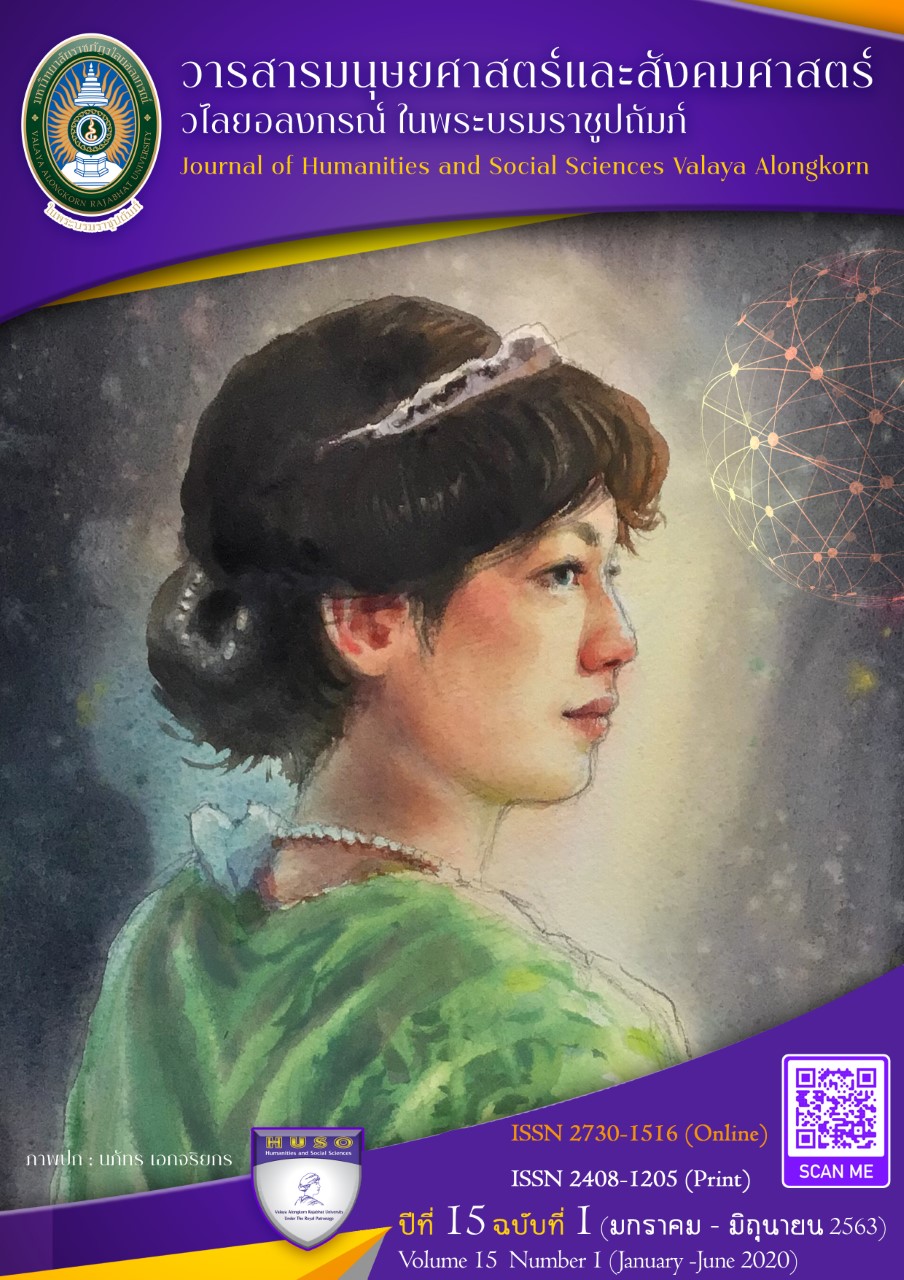THE RELATIONSHIP AMONG AUTHENTIC LEADERSHIP, JOB SATISFACTION, AND ORGANIZATIONAL COMMITMENT AMONG EMPLOYEES OF REAL ESTATE COMPANY IN BANGKOK
Main Article Content
Abstract
The objectives of this research study were to: 1. investigate the level of authentic leadership, job satisfaction and organization commitment of a company’s employees 2. explore the relationship among authentic leadership, job satisfaction and organization commitment of a company’s employees; and 3. study variables for predicting organization commitment of a company’s employees in authentic leadership, and job satisfaction. Questionnaires were used as a research instrument. Statistical analysis was percentage, frequency, mean, standard deviation and Pearson’s Product, and multiple regression analysis were used to analyze the data. Research results were as follows: 1. The level of Authentic leadership
and Organization commitment of a company’s employees was high, on the other hand, level of Job satisfaction was moderate 2. Job satisfaction was significantly positive correlated with authentic leadership (r = .729, p < .01) and Job satisfaction was significantly positive correlated with the organization commitment (r = .594 p < .01) and Authentic leadership was significantly positive correlated with Organization commitment
(r = .505, p < .01) 3. Authentic leadership and Job satisfaction were accountable for 36.3 percent of Real Estate Company employee’s organization commitment.
Article Details
ลิขสิทธิ์บทความวิจัยที่ได้รับการตีพิมพ์เผยแพร่ในวารสารมนุษยศาสตร์และสังคมศาสตร์ วไลยอลงกรณ์ ในพระบรมราชูปถัมภ์ ถือเป็นกรรมสิทธิ์ของคณะมนุษยศาสตร์และสังคมศาสตร์ มหาวิทยาลัยราชภัฏวไลยอลงกรณ์ ในพระบรมราชูปถัมภ์ ห้ามนำข้อความทั้งหมดหรือบางส่วนไปพิมพ์ซ้ำ เว้นแต่จะได้รับอนุญาตจากมหาวิทยาลัยเป็นลายลักษณ์อักษร
ความรับผิดชอบ เนื้อหาต้นฉบับที่ปรากฏในวารสารมนุษยศาสตร์และสังคมศาสตร์ วไลยอลงกรณ์ ในพระบรมราชูปถัมภ์ เป็นความรับผิดชอบของผู้นิพนธ์บทความหรือผู้เขียนเอง ทั้งนี้ไม่รวมความผิดพลาดอันเกิดจากเทคนิคการพิมพ์
References
ธีรภัทร กุโลภาส.(2556). อิทธิพลของภาวะผู้นำที่แท้จริงที่มีต่อผลสัมฤทธิ์ทางการเรียนของนักเรียนโดยมีการมองโลกเชิงบวกทางวิชาการและความยึดมั่นผูกพันของครูเป็นตัวแปรส่งผ่านและขนาดโรงเรียนเป็นตัวแปรปรับ: การวิจัยแบบผสมวิธี. (วิทยานิพนธ์ปริญญาดุษฎีบัณฑิต). จุฬาลงกรณ์มหาวิทยาลัย, คณะครุศาสตร์, สาขาธีวิทยาการวิจัยการศึกษา.
สุธาสินี แสงมุกดา. (2554). การพัฒนาเครื่องมือวัดภาวะผู้นำที่แท้จริงของผู้บริหารสถานศึกษาขั้นพื้นฐาน. (วิทยานิพนธ์ปริญญาดุษฎีบัณฑิต), จุฬาลงกรณ์มหาวิทยาลัย, คณะครุศาสตร์, สาขาบริหารการศึกษา.
สันต์ฤทัย ลิ่มวีรพันธ์ (2550). ความผูกพันของพนักงานต่อองค์การ (Employee Engagement. กรณีศึกษาบริษัท ระยองเพียวริฟายเออรจํากัด (มหาชน). (สารนิพนธ์มหาบัณฑิต), สถาบัน บัณฑิตพัฒนบริหารศาสตร์, คณะพัฒนาทรัพยากรมนุษย์, สาขาบริหารการศึกษา.
Allen, N. J., & Meyer, J.P. (1990). The measurement and antecedents of affective, Continuance and Normative Commitment to the Organization. Journal of Occupation Psychology, pp. 1-18
Anthony Gatling, Hee Jung Annette Kang, Jungsun Sunny Kim, (2016) "The effects of authentic leadership and organizational commitment on turnover intention", Leadership & Organization Development Journal, Vol.5 Issue: 6, pp.24-37
Buchanan, B. “Building Organization Commitment: The Socialization of Managers in Work Organizations”. Administrative Science Quarterly. (1974), 22: 533 – 546
Belal Albashiti, Khaleel Hajjaj, Wael Naeem Thabet (2017) Authentic Leadership and Organization commitment: The Mediating role of Positove Psychological
Capital Case of Alazhar University-Gaza.IOSR Journal of Business and Management
Choi, H. G., & Ahn, S. H. (2016). Influence of nurse managers' authentic leadership on nurses'organizational commitment and job satisfaction: focused on the mediating effects of empowerment. Journal of Korean Academy of Nursing,46(1), 100-108.
Darvish, H., Rezaei, F. (2011) The impact of authentic leadership on job satisfaction and team commitment. Management and Marketing, 6: 421-436.
Giallonardo, L. M., Wong, C. A., & Iwasiw, C. L. (2010). Authentic leadership of preceptors: predictor of new graduate nurses' work engagement and job satisfaction. Journal of nursing management, 18(8), 993-1003.
Locke, E.A (1976) The nature and cause of job satisfaction. In M.D. Dunnette (Ed.), Handbook of industrial and organization psychology (pp.1297-1349). Chicago: Rand McNally.
Miner, A. S. (1992). The shadow of the future: Effects of anticipated interaction and frequency of contact on buyer-seller cooperation. Academy of management journal, 35(2), 265-291.
Mowday, R.T., L.W. Porter, and R.M. Steers. (1982). Employee – Organization Linkages: The Psychology of Commitment, Absenteeism and Turnover. New York: Academic Press
Rovinelli, R. J., & Hambleton, R. K. (1997). On the use of content specialists in the assessment of criterion-referenced test item validity. Dutch Journal of Educational Research. 2, 49-60
Ruggiero, J. S. (2005). Health, work variables, and job satisfaction among nurses. Journal of Nursing Administration, 35(5), 254-263.
Sheldon, M.E. (1971) “Investments and Involvements as Mechanism Producing Commitment to the Organization” Administrative Science Quarterly. 16:2:143-150
Smith, P.C., L.M. Kendall and C.L. Hulin. (1969). The Measurement of Job Satisfaction in Work and Retirement. Chicago: Rand McNally.
Toor, S. & Ofori, G. (2008). Leadership for the future construction industry: Agenda for authentic leadership. International Journal of Project Management, 26, 620-630.
Walumbwa, F., Avolio, B., Gardner, W., Wernsing, T. & Peterson, S. (2008). Authentic Leadership: Development and Validation of a Theory-Based Measure. Journal of Management. 34, 89-126.
Wong, C. A., & Cummings, G. G. (2009). The influence of authentic leadership behaviors on trust and work outcomes of health care staff. Journal of Leadership Studies, 3(2), 6-23.
Yamane, T. (1973). Statistics: An Introductory Analysis. (3rd ed.). New York: Harper and Row.
Yon, J. H., Kim, J. B., Ko, K. M., & Park, S. H. (2016). A study of the relationship of authentic leadership, job satisfaction, organizational commitment, and self- efficacy. Indian Journal of Science and Technology, 9(26)


